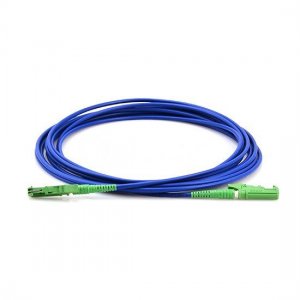Armored Patch Cord: Enhanced Durability for Secure Network Connections
May 16, 2025 | News | No Comments

# Armored Patch Cord: Enhanced Durability for Secure Network Connections
## What is an Armored Patch Cord?
An armored patch cord is a specialized type of Ethernet cable designed with additional protective layers to ensure superior durability and protection in demanding environments. Unlike standard patch cords, these cables feature a robust metal or reinforced plastic armor that shields the internal conductors from physical damage, electromagnetic interference, and environmental hazards.
## Key Features of Armored Patch Cords
### 1. Superior Physical Protection
The most distinctive feature of armored patch cords is their protective outer layer. This armor typically consists of:
– Interlocking metal armor (often steel or aluminum)
– Corrugated metal tubing
– Reinforced plastic sheathing
This construction provides excellent resistance against:
– Crushing forces
– Rodent damage
– Accidental impacts
– Abrasion and wear
### 2. Enhanced EMI/RFI Shielding
Armored patch cords offer superior electromagnetic interference (EMI) and radio frequency interference (RFI) protection compared to standard cables. The metal armor acts as an effective shield, making these cables ideal for:
– Industrial environments with heavy machinery
– Data centers with high-density cabling
– Areas with significant electrical noise
### 3. Environmental Resistance
These cables are designed to withstand harsh conditions, including:
– Extreme temperatures (-40°C to +75°C)
– Moisture and humidity
Keyword: armored patch cord
– Chemical exposure
– UV radiation (for outdoor-rated versions)
## Applications of Armored Patch Cords
Armored patch cords find use in various demanding environments where standard cables would be at risk:
### Industrial Settings
– Factory automation systems
– Manufacturing equipment connections
– Process control networks
### Outdoor Installations
– Security camera systems
– Outdoor Wi-Fi access points
– Temporary event networking
### High-Security Areas
– Government facilities
– Financial institutions
– Military installations
### Data Centers
– High-density server racks
– Equipment with frequent movement
– Areas requiring extra cable protection
## Choosing the Right Armored Patch Cord
When selecting an armored patch cord, consider these factors:
### 1. Cable Category
Armored versions are available for various Ethernet standards:
– Cat5e (up to 1 Gbps)
– Cat6 (up to 10 Gbps)
– Cat6a (up to 10 Gbps with better performance)
– Cat7 (up to 10 Gbps with improved shielding)
### 2. Armor Type
– Steel armor: Maximum protection but less flexible
– Aluminum armor: Good protection with better flexibility
– Plastic armor: Lightweight protection for less demanding environments
### 3. Length Requirements
Standard lengths range from 0.5m to 30m, with custom lengths available for specific installations.
### 4. Connector Types
Common options include:
– RJ45 (standard Ethernet)
– Field-terminable connectors
– Specialized industrial connectors
## Installation Considerations
While armored patch cords offer superior protection, they require proper handling:
– Bend radius: Typically larger than standard cables (usually 8x cable diameter)
– Weight: Heavier than standard cables, requiring proper support
– Grounding: Metal-armored versions may require proper grounding
– Flexibility: Less flexible than standard cables, affecting routing options
## Maintenance and Longevity
Armored patch cords typically offer:
– Longer lifespan than standard cables (often 10+ years)
– Reduced maintenance requirements
– Better performance consistency over time
– Higher resistance to connector wear
## Cost Considerations
While armored patch cords are more expensive than standard versions (typically 20-50% more), they offer:
– Lower total cost of ownership in harsh environments
– Reduced downtime from cable failures
– Fewer replacements over time
– Better protection for expensive network equipment
## Future Trends
The armored patch cord market continues to evolve with:
– Lighter armor materials without sacrificing protection
– Improved flexibility for easier